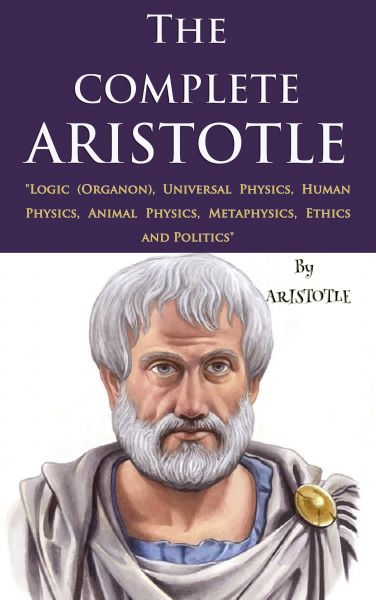The Complete Aristotle
"Logic (Organon), Universal Physics, Human Physics, Animal Physics, Metaphysics, Ethics and Politics"
The Corpus Aristotelicum (The Complete Aristotle) is the collection of Aristotle's works that have survived from antiquity through Medieval manuscript transmission. These texts, as opposed to Aristotle's lost works, are technical philosophical treatises from within Aristotle's school. Reference to them is made according to the original texts of Aristotle, which in turn is based on ancient classifications of these works.
This complete Book consist of (Contents):
Biography (About Aristotle)
Part 1: Logic (Organon)
Part 2. Universal Physics
Part 3: Human Physics
Part 4: Animal Physics
Part 5: Metaphysics
Part 6: Ethics and Politics
Part 7: Aesthetic Writings
Aristotle, Greek Aristoteles, (born 384 BCE, Stagira, Chalcidice, Greece—died 322, Chalcis, Euboea), ancient Greek philosopher and scientist, one of the greatest intellectual figures of Western history. He was the author of a philosophical and scientific system that became the framework and vehicle for both Christian Scholasticism and medieval Islamic philosophy. Even after the intellectual revolutions of the Renaissance, the Reformation, and the Enlightenment, Aristotelian concepts remained embedded in Western thinking.
Aristotle's intellectual range was vast, covering most of the sciences and many of the arts, including biology, botany, chemistry, ethics, history, logic, metaphysics, rhetoric, philosophy of mind, philosophy of science, physics, poetics, political theory, psychology, and zoology. He was the founder of formal logic, devising for it a finished system that for centuries was regarded as the sum of the discipline; and he pioneered the study of zoology, both observational and theoretical, in which some of his work remained unsurpassed until the 19th century. But he is, of course, most outstanding as a philosopher. His writings in ethics and political theory as well as in metaphysics and the philosophy of science continue to be studied, and his work remains a powerful current in contemporary philosophical debate.
A friend to all is a friend to none.
A likely impossibility is always preferable to an unconvincing possibility.
All human actions have one or more of these seven causes: chance, nature, compulsions, habit, reason, passion, desire.
All human beings, by nature, desire to know.
All men by nature desire knowledge.
- Aristotle, The Corpus Aristotelicum
Versandkostenfreie Lieferung! (eBook-Download)
Als Sofort-Download verfügbar
- Artikel-Nr.: SW9786057876621110164
- Artikelnummer SW9786057876621110164
-
Autor
Aristotle, Aristotle, E. M. Edghill, R. P. Hardie, R. K. Gaye, J. A. Smith, D'Arcy Wentworth Thompson, W. D. Ross, W. Rhys Roberts
- Wasserzeichen ja
- Verlag E-Kitap Projesi & Cheapest Books
- Seitenzahl 2000
- Veröffentlichung 06.12.2023
- ISBN 9786057876621

